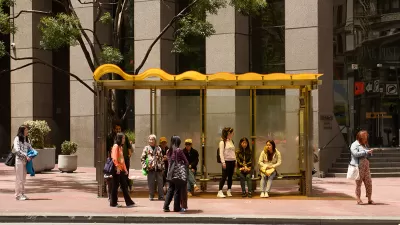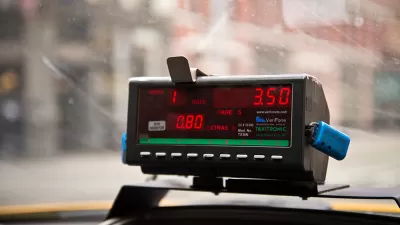The San Jose City Council is considering a proposal to ban plastic bags and most paper bags in supermarkets, out of concerns about the greenhouse gases used to manufacture them and about the waste from discarded bags. But this policy might create as many environmental problems as it solves. In a city without disposable bags, shoppers who seek to buy large amounts of groceries will have to drag around an army of nondisposable containers. For drivers, this is not a big deal. Susie SUV can always find space for dozens of nondisposable bags in her truck. And because Susie’s bags can stay in her truck forever, she will always be able to make impulse purchases without difficulty.
The San Jose City Council is considering a proposal to
ban plastic bags and most paper bags in supermarkets, out of concerns about the greenhouse
gases used to manufacture them and about the waste from discarded
bags. But this policy might create as many environmental problems
as it solves.
In a city without disposable bags, shoppers who seek to buy large
amounts of groceries will have to drag around an army of nondisposable
containers. For drivers, this is not a big deal. Susie SUV can always
find space for dozens of nondisposable bags in her truck. And because Susie's bags
can stay in her truck forever, she will always be able to make impulse
purchases without difficulty.
But pedestrian shoppers will have more trouble dragging around an
armada of bags – both because a pedestrian cannot carry as many bags as
an SUV, and because a pedestrian may not always know in advance when
he/she wants to go shopping.
So in a "no disposables" city, shopping (especially for a family) becames a hassle for pedestrians. If a pedestrian wishes to shop, he/she must limit purchases to the amount of groceries that will fit into the bags he/she can carry to the grocery store, and must remember to bring those bags to the store. Thus, an anti-disposables law widens the "convenience gap" between drivers and pedestrians. (And given the amount of hurdles that car-dependent North America creates for pedestrians, do we really need one more?)
It follows that such laws give consumers yet another incentive to drive rather than walk to the grocery store- or even to drive if there is an outside chance she may
wish to go shopping. Thus, a complete ban on bags encourages driving,
which in turn increases greenhouse emissions and a wide variety of
other environmental ills.
Does this mean that municipalities must choose between pollution from
cars and pollution from bags? Not necessarily. Toronto has created a
middle ground in the bag wars, imposing a 5-cent tax on disposable
bags- enough to allow nondrivers who really need bags to use them, yet
at the same time enough to deter frivolous bag use.
I have lived in Toronto
for three weeks, and find that I still have a few plastic bags (which I
recycle by using them as garbage bags) but use far fewer bags than I once
did. I place small purchases in the tote bag that I use for school
books, but have the option of purchasing plastic bags when I really
need them. And I still get by without a car.

Study: Maui’s Plan to Convert Vacation Rentals to Long-Term Housing Could Cause Nearly $1 Billion Economic Loss
The plan would reduce visitor accommodation by 25,% resulting in 1,900 jobs lost.

North Texas Transit Leaders Tout Benefits of TOD for Growing Region
At a summit focused on transit-oriented development, policymakers discussed how North Texas’ expanded light rail system can serve as a tool for economic growth.

Using Old Oil and Gas Wells for Green Energy Storage
Penn State researchers have found that repurposing abandoned oil and gas wells for geothermal-assisted compressed-air energy storage can boost efficiency, reduce environmental risks, and support clean energy and job transitions.

Private Donations Propel Early Restoration of Palisades Playground
Los Angeles has secured over $1.3 million in private funding to restore the Pacific Palisades playground months ahead of schedule, creating a modern, accessible space that supports community healing after recent wildfires.

From Blight to Benefit: Early Results From California’s Equitable Cleanup Program
The Equitable Community Revitalization Grant (ECRG) program is reshaping brownfield redevelopment by prioritizing projects in low-income and environmental justice communities, emphasizing equity, transparency, and community benefits.

Planting Relief: Tackling Las Vegas Heat One Tree at a Time
Nevada Plants, a Las Vegas-based nonprofit, is combating the city’s extreme urban heat by giving away trees to residents in underserved neighborhoods, promoting shade, sustainability, and community health.
Urban Design for Planners 1: Software Tools
This six-course series explores essential urban design concepts using open source software and equips planners with the tools they need to participate fully in the urban design process.
Planning for Universal Design
Learn the tools for implementing Universal Design in planning regulations.
Ascent Environmental
Borough of Carlisle
Institute for Housing and Urban Development Studies (IHS)
City of Grandview
Harvard GSD Executive Education
Toledo-Lucas County Plan Commissions
Salt Lake City
NYU Wagner Graduate School of Public Service





























